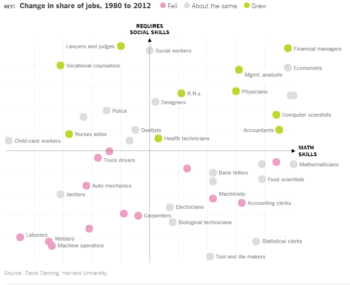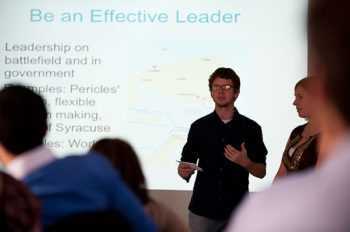Which Skills Will Drive The Jobs of Today and the Future? What Do Today’s High School and College Students Need to Acquire in Order to Be Employable?
Most parents and children grasp the importance of cognitive skills, but very few understand how college choices and majors impact their development. Worse, many families dramatically underestimate the importance of “soft” skill and the impact of college choices and majors on the development of these critical skill-sets. A college education that leads to fruitful outcomes must include both.
Which Skills Are Most Important? How Will My Child Develop Them? Which Colleges And Majors Lead To The Most In-Demand Skills For Today and The Future?
Let’s ask Harvard economist David Deming and the World Economic Forum about employment. Deming and the World Economic Forum’s recent report, “The Future of Jobs 2016,” highlighted the following skills as the basis of employ-ability for the today and the future. Cognitive skills, most importantly math and analytical skill, and “soft skills” such as social intelligence, perseverance, conscientiousness, self-control, leadership ability, independence, and executive function/organization form the foundation of those jobs that will not be automated or replaced by machine learning.

STEM (science, technology, engineering, and mathematics) majors guarantee that your child will build cognitive skill. Success in STEM programs is not as dependent on individualized instruction as most majors, though individual attention certainly helps. In all other majors, professor attention is a must.
The major drawback in choosing STEM majors is the high rate of failure. Only 50% of first-time college freshmen in STEM majors will acquire a degree in a STEM department, according to the U.S. Department of Education’s National Center for Education Statistics 2014 reporting. The other half will not succeed and will be routed to non-STEM majors. Only a small number of students possess the ability, drive, and commitment required for success in STEM, with an even smaller percentage capable of success in physics, engineering, mathematics, and computer science.
For non-STEM majors, a challenging curriculum and guidance and support from professors is crucial. Individualized teaching and assistance allows a student to build the essential technical, analytical, reading, and writing skills; specific and personalized critique and teaching is the main route to improvement. Such guidance and curriculum is guaranteed at smaller colleges, but a rare commodity at any university larger than 10,000 students. Professors, in classes of 300 or more students, do not have the time or patience to give personalized feedback.
For Soft Skills, Small Classes and Attention From Professors Are Crucial
For “soft” skills like social intelligence, leadership, poise, and conscientiousness, the learning environment is determinant. Professor and classmate feedback drives non-cognitive skill. Students improve their social skills with challenging learning and social experiences that push them out of their comfort zones.  Class presentations, in-class discussion and debate, activities and leadership roles, internships, and study abroad experiences; these are the critical components of a college education that leads to soft skill development. For soft skill development, large universities do not produce.
Class presentations, in-class discussion and debate, activities and leadership roles, internships, and study abroad experiences; these are the critical components of a college education that leads to soft skill development. For soft skill development, large universities do not produce.
In the modern workplace, people move between roles and projects and must be able to adapt to different sets of colleagues, customers, and demands. Knowledge and service work, the duty of nearly every high-paying job and industry, requires reading and writing ability, communication skill, research skill, and lots of adaptive and social skill.
Even for technical work in engineering and computer science, these skills are critical. Why have Google, Amazon, McKinsey, and other top firms moved away from traditional interviews towards situational and behavioral assessments?  Because they know that soft skills make or break an employee’s performance. A college graduate who possesses average skill on the cognitive side or is lacking in independence, social intelligence, conscientiousness, and organization simply cannot compete.
Because they know that soft skills make or break an employee’s performance. A college graduate who possesses average skill on the cognitive side or is lacking in independence, social intelligence, conscientiousness, and organization simply cannot compete.
Are Cognitive Or Soft Skills More Important For My Child’s Career? Which Skills Pay Off With Greater Salaries?
The Hamilton Project, part of the prestigious think-tank The Brookings Institute, has also done extensive research on the current labor market and the jobs of the future. Like Deming and the World Economic Forum, the Hamilton Project highlights soft skills as essential to success in the current and future job marketplace. While jobs that are composed of routine tasks and some mathematical tasks have plateaued, the growth in service and social tasks has exploded. Further, The Hamilton Project Report on Economic Facts 2016, has shown that earnings are strongly linked with both higher cognitive and soft skills.
Cognitive skills, the kinds one develops in a good college education like analysis, synthesis, computer, math, reading, and writing skills, drive incomes. The Hamilton Project Report shows that those in the top 20% on cognitive skill measures earn on average an additional $10-20,000 per year versus those in the middle ranges of cognitive skill. A good college education will easily add to your child’s earning power.
Just like Deming and the World Economic Forum have found, The Hamilton Project Report finds that soft skills have a huge impact on earnings as well. Those who are in the top 20% in soft skill earn approximately $20-30,000 of additional income per year versus their peers in the middle ranges. The highest earners in America possess social and adaptive skills in the top 10% of the distribution. If you develop high levels of cognitive and soft skill, you are nearly certain to earn a high level of income.
A very small percentage of students are born with extensive gifts in both cognitive and soft skills. There is a tiny group of students that just outshines the competition in every domain. This group of genetic lottery winners can succeed in any university or in any career path. People like Bill Gates, Steve Jobs, and Mark Zuckerberg embody the image of exceptional ability across the board.
Mere mortals must rely on growth and education as their ticket to success. This is why it is so important to gain a college education that is attuned to the exact traits and needs of your child. Now more than ever, there are incredible opportunities for an interesting and lucrative future. The monetary reward for those who possess high levels of cognitive and soft skill is greater than ever before. At the same time, those who do not acquire the skills that lead to career success will face a future that is far less bright than hoped for.

